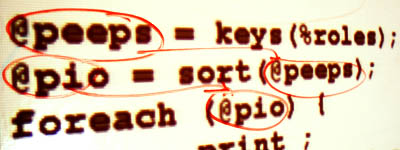
|
| Home | Accessibility | Courses | Diary | The Mouth | Forum | Resources | Site Map | About Us | Contact |
| For 2023 (and 2024 ...) - we are now fully retired from IT training. We have made many, many friends over 25 years of teaching about Python, Tcl, Perl, PHP, Lua, Java, C and C++ - and MySQL, Linux and Solaris/SunOS too. Our training notes are now very much out of date, but due to upward compatability most of our examples remain operational and even relevant ad you are welcome to make us if them "as seen" and at your own risk. Lisa and I (Graham) now live in what was our training centre in Melksham - happy to meet with former delegates here - but do check ahead before coming round. We are far from inactive - rather, enjoying the times that we are retired but still healthy enough in mind and body to be active! I am also active in many other area and still look after a lot of web sites - you can find an index ((here)) |
Cottage Industry v Production Line coding
Posted by admin (Graham Ellis), 24 June 2007
The cottage industry is ideally suited to small, specialist production runs where a single task is performed by one operative on a whole but small batch of components, with the input coming from a basket at one side of the take and the modified output being placed in a completed (so far) basket at the far side. Here's an example of "cottage industry" code (in this case written in Perl) where each process takes a list (collection) input on the right hand side of the = sign, processes it and saves it in another list on the left had side, with a series of processes one after another.

But this is a less than ideal approach where there's a lot of product to be processed. It gets long winded and in coding terms many intermediate lists are set up which might hang around for quite a while. A better approach - for the right tasks is a production line approach ...
foreach (sort (keys (%roles))) {
Here, intermediate lists are not saved into named variables but, rather, are temporary and are released after they're no longer used. But in fact this example does not eliminate the intermediate lists completely; that can't be done simply with anything that needs to be sorted as you have to generate all the records before you can output the first - just in case it's a case of last in, first out.
A true production line scenario would be set up using loops iterating through each element in turn with no intermediate storage of more than a single scalar value. Perl's approach to that, using the example above, would be via the each function and a while loop (and we could not sort); in Python, we could take the same approach as in Perl or we could use one of those marvellous generator functions!
This page is a thread posted to the opentalk forum
at www.opentalk.org.uk and
archived here for reference. To jump to the archive index please
follow this link.
PH: 01144 1225 708225 • FAX: 01144 1225 793803 • EMAIL: info@wellho.net • WEB: http://www.wellho.net • SKYPE: wellho


